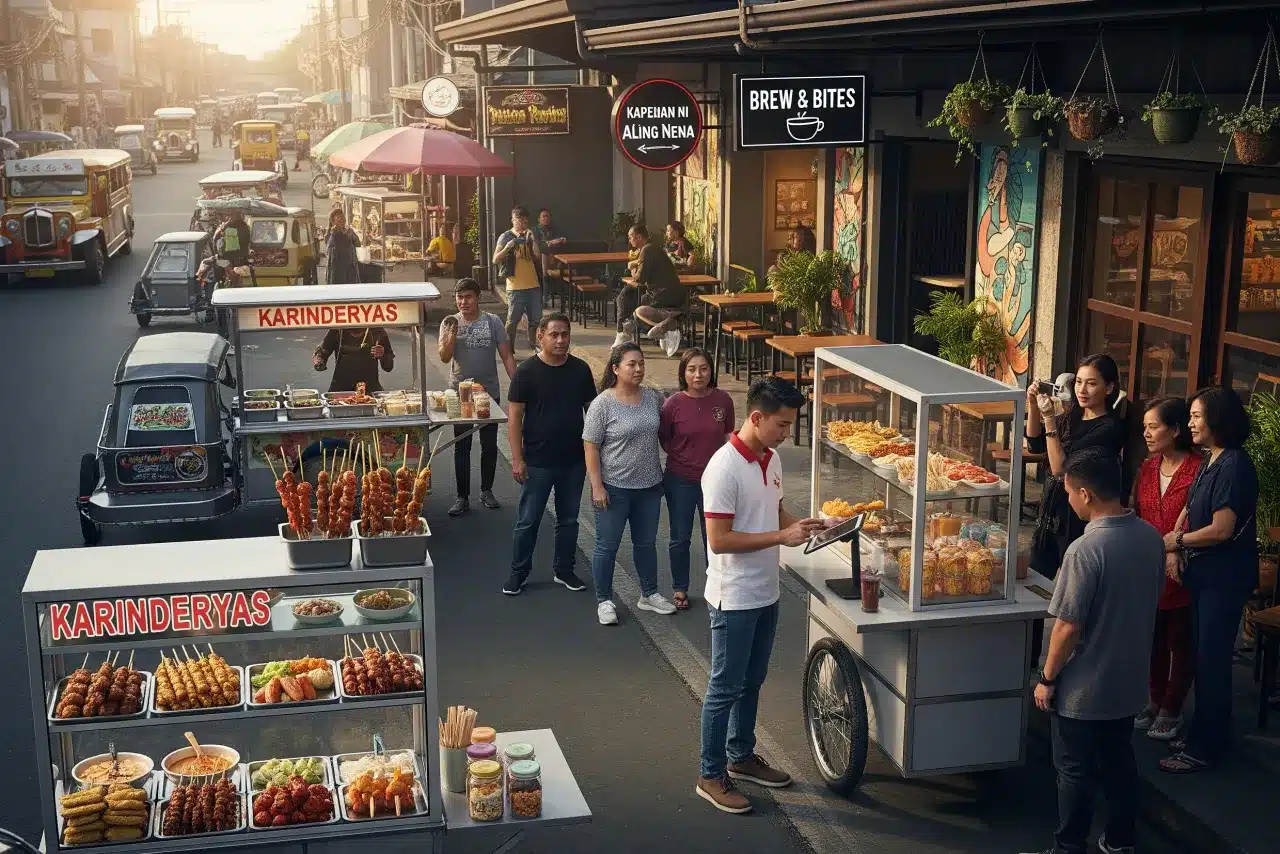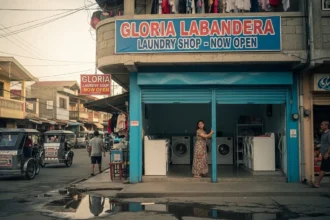Starting a small business in the Philippines has never been more appealing – or more challenging. With the rising cost of living, inflation pressures, and the unpredictability of traditional jobs, many Filipinos are turning to entrepreneurship as a path toward financial stability and freedom. Whether you’re a fresh graduate looking for independence, an OFW planning to return home, or a parent searching for an extra source of income, the year 2025 presents exciting opportunities for small-scale ventures.
- 🍲 1. Food Cart or Food Stall Business
- 🥤 2. Milk Tea and Coffee Shops
- 🥗 3. Healthy Food Delivery Service
- 🛍 4. Online Reselling (Shopee, Lazada, TikTok Shop)
- 📦 5. Dropshipping Business
- 🐕 6. Pet Services and Products
- 🧼 7. Laundry and Cleaning Services
- 🏠 8. Rental Properties and Boarding Houses
- 💻 9. Freelance Services (Online Work)
- 🎥 10. Content Creation (YouTube, TikTok, Blogging)
- 🌾 11. Urban Farming and Hydroponics
- 🛠 12. Handyman and Home Repair Services
- 🖨 13. Printing and Custom Merchandise
- 📚 14. Tutorial and Online Education Services
- 💇 15. Beauty and Wellness Services
- 📦 16. Logistics and Delivery Services
- 🌐 17. Social Media Management
- 🛒 18. Sari-Sari Stores and Mini-Groceries
- 📱 19. Mobile Phone Accessories and Repair
- 🌍 20. Eco-Friendly Products Business
- 📊 Table 1: Estimated Startup Capital (Philippines, 2025)
- ❓ Frequently Asked Questions (FAQ)
- ✨ Final Reflection: Building a Business in the Philippines in 2025
- 🚀 References
But here’s the catch: not all businesses are created equal. Some ideas thrive because they align with local needs and changing consumer habits, while others flop because they fail to adapt. Technology, lifestyle shifts, and even global events are reshaping how Filipinos spend and what businesses succeed. That’s why choosing the right business idea is crucial – it can mean the difference between quick failure and lasting success.
What makes 2025 particularly interesting is the convergence of digital adoption and local entrepreneurship. More Filipinos are shopping online, relying on delivery apps, and exploring digital services. At the same time, traditional businesses like food stalls, sari-sari stores, and farming remain resilient. This means aspiring entrepreneurs can choose from a wide spectrum of business opportunities – from online side hustles to physical businesses deeply rooted in Filipino culture.
In this article, we’ll explore 20 of the most promising small business ideas in the Philippines for 2025, complete with explanations, examples, and practical insights. Whether you want something low-capital, tech-driven, or community-based, there’s something here that could spark your next venture.

🍲 1. Food Cart or Food Stall Business
Food will always be one of the safest business ideas in the Philippines. With busy lifestyles, Filipinos continue to rely on affordable meals and snacks sold in convenient locations. Food carts selling fried chicken, siomai, fish balls, or milk tea thrive in malls, schools, and transportation hubs.
One of the reasons food stalls succeed is low startup costs compared to full restaurants. Franchises make it easy for beginners by providing branding, recipes, and training. However, independent stalls can also shine if you bring creativity and offer something unique like healthier options or trendy fusion snacks. The key is location and consistency.
🥤 2. Milk Tea and Coffee Shops
The craze for milk tea and specialty coffee isn’t dying anytime soon. In fact, smaller, Instagram-worthy cafés are now competing against big chains like Starbucks. Millennials and Gen Z, who value “third spaces” outside home and work, continue to fuel this demand.
With as little as ₱200,000–₱500,000, you can start a small coffee or milk tea shop. Partnerships with delivery apps like GrabFood or Foodpanda expand reach beyond walk-in customers. Offering seasonal drinks, loyalty cards, and strong branding can make even a small café stand out.
🥗 3. Healthy Food Delivery Service
More Filipinos are becoming health-conscious, especially after the pandemic years. There’s growing demand for meal prep services offering low-calorie, keto, or plant-based meals. Customers include busy professionals, fitness enthusiasts, and those managing health conditions.
This business can start at home with a kitchen, containers, and delivery coordination. Social media marketing and word-of-mouth referrals are essential to build trust. With the right menu planning and food safety practices, it’s possible to scale into a profitable long-term venture.
🛍 4. Online Reselling (Shopee, Lazada, TikTok Shop)
The e-commerce boom shows no signs of slowing in 2025. Filipinos love affordable finds online, and platforms like Shopee, Lazada, and TikTok Shop make it easy for anyone to become a seller. You don’t even need to manufacture products – reselling popular items like clothes, gadgets, or home goods can generate income.
The trick is to find trending products, manage good supplier relationships, and provide fast shipping. Marketing through TikTok videos or Facebook live selling gives sellers a big boost. With low startup capital, this is one of the easiest businesses to try.
📦 5. Dropshipping Business
For those who want an online store but don’t want to hold inventory, dropshipping is the answer. Here, you partner with suppliers who handle product storage and shipping, while you focus on marketing and customer service.
Dropshipping reduces upfront costs, but it requires digital marketing skills to stand out in a crowded space. Successful dropshippers often niche down, selling items like pet accessories, eco-friendly products, or beauty gadgets. With minimal capital and high scalability, this remains an attractive option for 2025.
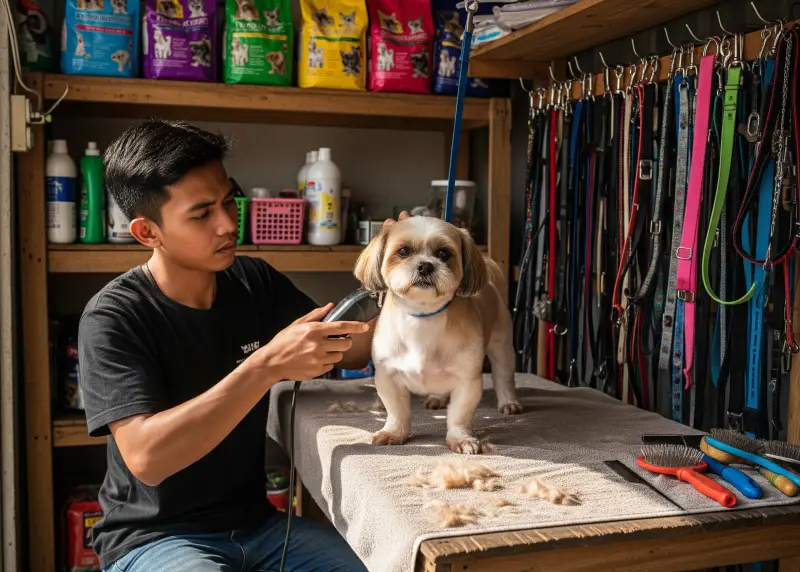
🐕 6. Pet Services and Products
Filipinos’ love for pets is booming, especially in urban centers. Businesses offering pet grooming, boarding, or organic pet food are thriving. The emotional attachment people have to their pets makes them willing to spend more on their fur babies.
Starting small is possible with a pet grooming service from home. As demand grows, expanding into a pet shop or veterinary partnership can open new revenue streams. Social media is an excellent way to showcase services, with cute before-and-after grooming photos drawing attention.
🧼 7. Laundry and Cleaning Services
Busy city workers don’t always have time for laundry or deep-cleaning their homes. This creates a reliable market for laundry shops and home-cleaning services. With high population density in condos and urban centers, the demand is consistent year-round.
Startup costs vary depending on whether you buy commercial washing machines or start with basic equipment. Marketing through community groups or Grab/Angkas partnerships helps expand reach. Consistent service and trust-building are crucial to maintaining long-term customers.
🏠 8. Rental Properties and Boarding Houses
With continued urban migration, affordable housing is always in demand. Small apartments, dormitories near schools, and boarding houses for workers provide steady income. While this requires higher capital than most small businesses, the returns are relatively stable.
Many Filipinos use Pag-IBIG housing loans or joint family investments to fund these ventures. Property management and tenant relationships are key to ensuring sustainable income. This remains a long-term business with generational potential.
💻 9. Freelance Services (Online Work)
Filipinos are among the top freelancers in the world, excelling in virtual assistance, graphic design, content writing, and IT support. With platforms like Upwork, Fiverr, and OnlineJobs.ph, anyone with skills can tap into global markets.
Unlike physical businesses, freelancing requires minimal startup cost – just a computer, internet connection, and portfolio. With dedication, freelancers can earn from $500 to $2,000+ per month. Upskilling is crucial, as competition is global and quality expectations are high.
🎥 10. Content Creation (YouTube, TikTok, Blogging)
Filipino creators are thriving online, from vloggers and gamers to lifestyle influencers. YouTube ad revenue, TikTok sponsorships, and blogging affiliate marketing all provide income streams. While competition is fierce, niche content with strong engagement can succeed.
Consistency and creativity are the lifeblood of this business. Building a loyal audience takes time, but the payoff can be huge – not just financially, but also in terms of influence and career opportunities.
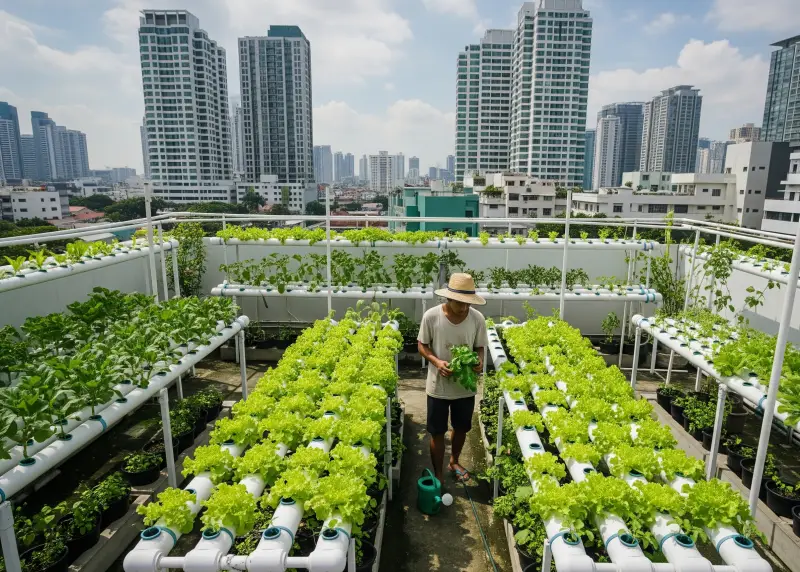
🌾 11. Urban Farming and Hydroponics
As food prices rise, urban farming is becoming more relevant. Filipinos in cities are exploring hydroponics, container gardening, and rooftop farms to supply fresh vegetables. This business taps into both sustainability and profit trends.
While it requires knowledge of agriculture and some capital for equipment, the growing demand for fresh, organic produce makes it worthwhile. Schools, restaurants, and households are potential customers.
🛠 12. Handyman and Home Repair Services
Filipinos often need affordable carpenters, electricians, and plumbers, but reliable service providers are hard to find. Starting a handyman business addresses this gap.
This can be run solo at first, then expanded into a team. Registering on online platforms like Angkas or TaskRabbit equivalents (when they emerge locally) can help connect with customers. Professionalism and word-of-mouth referrals are crucial.
🖨 13. Printing and Custom Merchandise
Small businesses, schools, and individuals always need printing services, tarpaulins, or custom shirts and mugs. This industry has been resilient, and with personalization trends, it continues to evolve.
Starting with a basic heat press and printer is affordable. Marketing via Shopee or Lazada expands reach. Offering bulk discounts for schools or local businesses helps secure steady clients.
📚 14. Tutorial and Online Education Services
With parents seeking extra support for their kids, tutorial centers and online classes remain in demand. This also extends to skills training for adults – from English lessons to coding bootcamps.
The pandemic accelerated acceptance of online learning, which continues into 2025. Small tutoring businesses can thrive by focusing on niches like math, science, or ESL for foreigners.
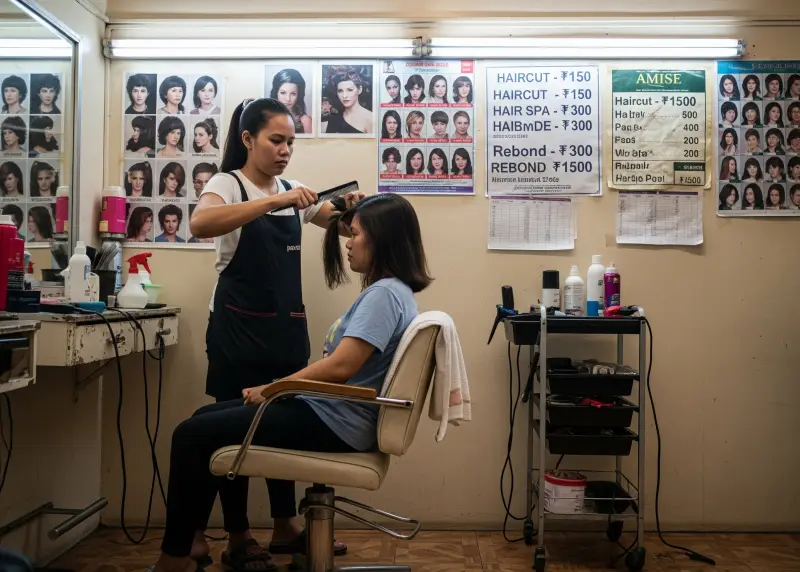
💇 15. Beauty and Wellness Services
Filipinos love self-care, making salons, nail spas, and massage services reliable businesses. Mobile beauty services are also rising, with professionals bringing services directly to homes.
Competition is tough, so branding and consistent quality matter. Offering packages, loyalty cards, or wellness bundles can attract repeat customers.
📦 16. Logistics and Delivery Services
With e-commerce growth, logistics remains a goldmine. Small-scale delivery services serving neighborhoods or barangays can be profitable.
Motorcycles are relatively affordable for riders, and partnerships with online stores can keep demand steady. This business is particularly promising outside Metro Manila, where big logistics players are less dominant.
🌐 17. Social Media Management
Small businesses increasingly need help running Facebook, TikTok, and Instagram accounts. Freelancers who offer content creation, scheduling, and analytics services are in demand.
This requires low capital but strong digital skills. Building a portfolio with a few clients can lead to referrals and steady income. As more businesses go digital, this role is becoming essential.
🛒 18. Sari-Sari Stores and Mini-Groceries
The classic sari-sari store remains one of the most common small businesses in the Philippines. With inflation pushing prices up, people often buy tingi-tingi (small amounts), making sari-sari stores essential.
To stand out in 2025, owners can adopt digital wallets, delivery options, or loyalty programs. Partnering with microfinancing apps may also provide easier restocking.
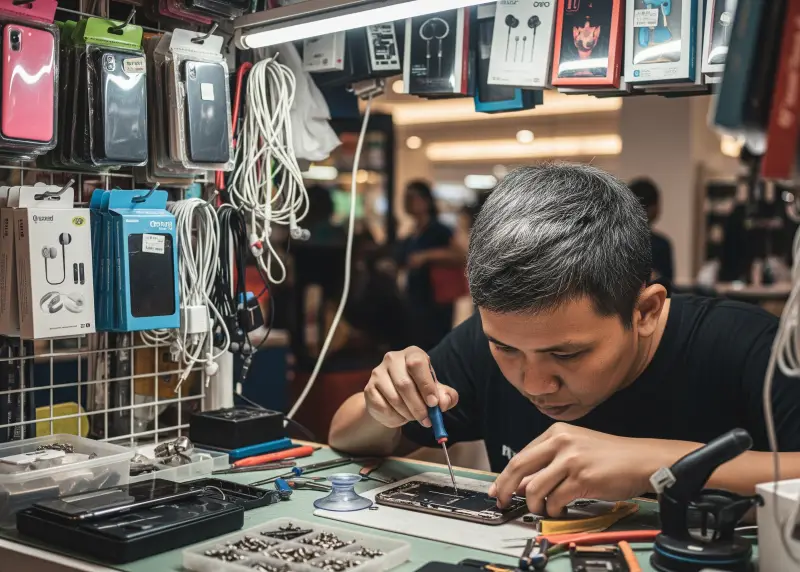
📱 19. Mobile Phone Accessories and Repair
Filipinos are heavy smartphone users, creating endless demand for chargers, cases, and screen protectors. Affordable repair services are also in high demand, especially in areas with fewer repair shops.
This requires technical skills but low capital. A small shop in a mall or tiangge can generate steady traffic. Adding e-commerce sales boosts reach further.
🌍 20. Eco-Friendly Products Business
Sustainability is no longer just a trend – it’s a consumer demand. Businesses offering eco-bags, bamboo utensils, reusable bottles, and organic soaps are booming. Filipinos are increasingly aware of plastic waste and climate change, creating loyal markets for green businesses.
Partnering with local artisans or suppliers can keep costs low while adding authenticity. Strong branding and social media marketing help capture eco-conscious millennials and Gen Z.
📊 Table 1: Estimated Startup Capital (Philippines, 2025)
| Business Idea | Estimated Capital | Difficulty Level | Potential Return |
|---|---|---|---|
| Food Cart | ₱50,000 – ₱150,000 | Moderate | High (daily cash flow) |
| Milk Tea / Coffee Shop | ₱200,000 – ₱500,000 | High | High |
| Online Reselling | ₱10,000 – ₱50,000 | Easy | Medium |
| Freelance Services | ₱5,000 – ₱30,000 | Easy | High (global clients) |
| Rental Properties | ₱500,000+ | Hard | High, long-term |
| Eco-Friendly Products | ₱50,000 – ₱200,000 | Moderate | Medium |
❓ Frequently Asked Questions (FAQ)
1. What’s the cheapest small business to start in the Philippines?
Online reselling and freelancing require the least capital, often just a few thousand pesos for internet and basic tools. Food carts are also relatively affordable compared to larger ventures.
2. Which small business gives the fastest return on investment?
Food stalls and sari-sari stores usually give daily income, making ROI faster. However, profitability depends on location and management.
3. What business is best for OFWs returning to the Philippines?
Rental properties, food businesses, or franchising are popular among OFWs. These businesses provide stability while allowing family members to help manage them.
4. Can students start small businesses?
Yes! Many students start online reselling, social media management, or tutorial services while studying. These require low capital and can fit around school schedules.
5. Are franchises better than independent businesses?
Franchises provide support and branding but require higher capital and ongoing fees. Independent businesses give you more control and flexibility but need more effort in marketing.
6. How much capital do I need for a milk tea shop?
A small milk tea shop may require ₱200,000–₱500,000, depending on equipment, rent, and branding. Some micro-franchises offer cheaper packages.
7. Are eco-friendly businesses really profitable?
Yes, eco-friendly products are gaining strong demand. Success depends on good branding, sourcing affordable supplies, and targeting the right audience.
8. What business can thrive outside Metro Manila?
Logistics, farming-related businesses, sari-sari stores, and boarding houses are excellent outside urban centers, where daily needs and services are more in demand.
9. Do I need to register my small business with the government?
Yes, registration with the DTI (for sole proprietorship) or SEC (for corporations) ensures legality. It also helps you access loans, grants, and tax benefits.
10. What’s the best small business in 2025 overall?
There’s no single “best” business. The ideal one depends on your skills, interests, location, and capital. The key is matching your strengths with market demand.
✨ Final Reflection: Building a Business in the Philippines in 2025
Starting a small business in the Philippines is not just about earning money – it’s about taking control of your future. In 2025, opportunities are wide open for those who are willing to take risks, adapt to new consumer habits, and put in the effort. From food stalls to online stores, every venture represents not just a livelihood, but also a chance to make a lasting impact on your family and community.
But success doesn’t come overnight. Entrepreneurship requires resilience, patience, and continuous learning. Many small businesses fail not because the idea was bad, but because execution was weak or persistence was lacking. This means that beyond choosing the right business idea, you must also commit to the daily grind of managing, marketing, and improving your operations.
At the same time, technology is leveling the playing field. Social media marketing, e-wallet payments, and online platforms make it possible for even the smallest businesses to compete with larger ones. If you embrace these tools, you can scale your venture faster and reach customers you never imagined before.
So if you’ve been waiting for the “perfect time” to start, know this: there’s no such thing. The best time to begin is now. Even a small step – like selling online or testing a food product in your neighborhood – can spark a bigger journey. The most successful entrepreneurs are not those who waited for luck, but those who acted with courage and consistency.
2025 could be the year you change your life. The question is – will you take that leap?
🚀 References
-
Digido PH – 20 Small Businesses to Start in the Philippines 2025
-
Filepino – 10 Small Business Ideas to Start in PH 2025
-
Triple i Consulting – 10 Negosyo Ideas to Start in PH 2025
-
StoreHub PH – 30 Best Retail Business Ideas for Filipinos (2025)
-
Madiskarte Moms – Success Stories: Filipino Mompreneurs



